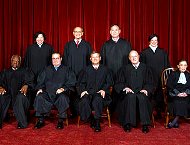Article from: www.thenewspaper.com/news/43/4316.asp
1/22/2014
US Supreme Court Considers Traffic Stop Informants
US Supreme Court hears oral arguments in a case that will decide whether anonymous tips are enough to justify traffic stops.
 Can a motorist be pulled over merely because an anonymous individual called with a "tip" to set him up with a roadside police encounter? The US Supreme Court weighed the question Tuesday, hearing oral arguments in the case Navarette v. California.
Can a motorist be pulled over merely because an anonymous individual called with a "tip" to set him up with a roadside police encounter? The US Supreme Court weighed the question Tuesday, hearing oral arguments in the case Navarette v. California.
On August 23, 2008, someone called 911 and said a silver Ford F150 pickup had run him off the road on Highway 1 in Mendocino County. California Highway Patrol Officer Thaddeus Williams saw the truck about 18 minutes later and pulled over the driver, Lorenzo Prado Navarette, who was later charged with marijuana possession.
Navarette's lawyer, Paul R. Kleven, argued that allowing vague tips would undermine the reasonable suspicion standard -- that an officer must have a good reason to think the driver is committing a crime -- that has governed traffic stops for four decades.
"The court has shown skepticism for anonymous tips because the tipsters are able to harass other people without running any risk of being held accountable," Kleven argued. "It should be particularly skeptical in the case of anonymous tips about erratic driving, because with the ubiquitous cell phones, it's so easy for somebody who's on the road -- who's been annoyed by somebody else -- to just pull out the cell phone and call in a false tip."
Several of the justices expressed skepticism about whether false tips were an actual problem. Others suggested, even if they were, there is no legal problem with tip-based stops.
"In the context in which we've approved sobriety checkpoints, why should we get bent out of shape over this?" Justice Elena Kagan asked. "Why should we be more concerned when an individual automobile is pulled over?"
Kleven insisted that an police officer should corroborate any call about a drunk driver by watching for signs of bad driving before stopping the suspect vehicle.
"What if there's no way for the officer to corroborate the allegation?" Chief Justice John Roberts asked. "Somebody calls with an anonymous tip saying this fellow, you know, in this car has got a child in the trunk. The police can follow the person, you know, for hours and they're not going to see any corroborating evidence."
Pulling the case back to the facts at hand, Kleven responded that it would likely be pointless to pull over someone on a "ran me off the road" tip without corroborating evidence.
"If they can't see any erratic driving still going on, then where is it going to go?" Kleven asked. "They're not going to prosecute for the reckless driving that allegedly took place 19 miles away."
On behalf of California prosecutors, Jeffrey K. Laurence pointed out that between 25 and 50 percent of phone calls tips result in arrests, so a phone tip should constitute reasonable suspicion of a crime that should be immediately investigated. Justice Antonin Scalia countered that the statistics mean 50 to 75 percent were stopped without just cause. The court pushed the prosecutors to see whether they would agree to any limits to prevent malicious stops.
"I'm talking about the concern that you want to have the police pull over people that you don't like, where you know somebody's got something bad in the car and you don't like it, and so you're going to take advantage of the fact that the police don't have to observe anything and yet you can still get them to pull over this person," Justice Roberts said.
The prosecution is hoping when the justices arrive at their final decision, they will side with a "totality of circumstances" standard that would allow most anonymous tips to result in stops.
 Can a motorist be pulled over merely because an anonymous individual called with a "tip" to set him up with a roadside police encounter? The US Supreme Court weighed the question Tuesday, hearing oral arguments in the case Navarette v. California.
Can a motorist be pulled over merely because an anonymous individual called with a "tip" to set him up with a roadside police encounter? The US Supreme Court weighed the question Tuesday, hearing oral arguments in the case Navarette v. California.